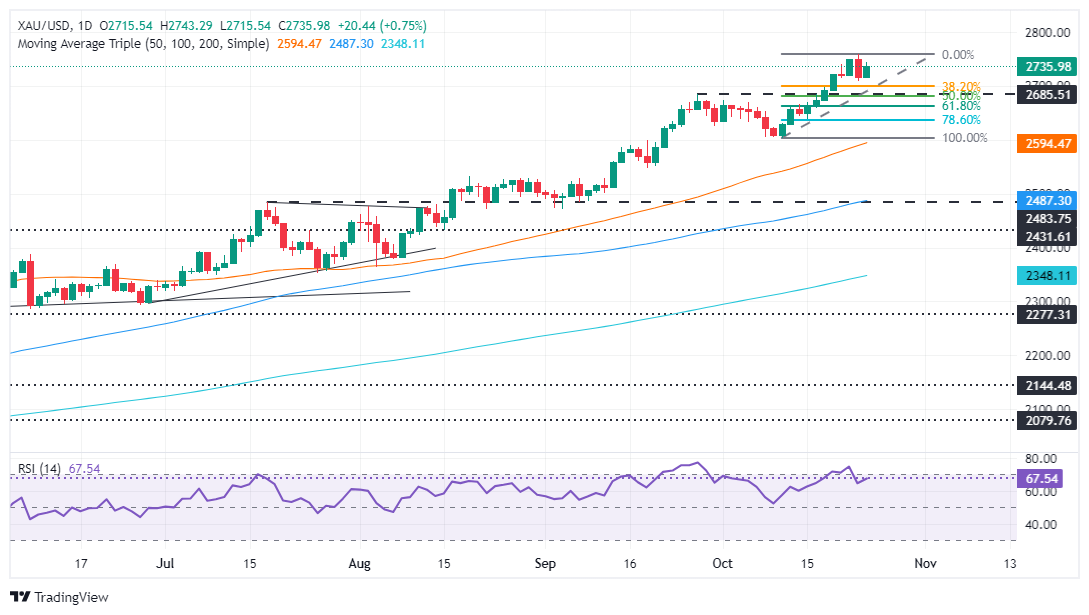- Gold advances as US Treasury yields fall alongside the US Dollar.
- Tensions due to the Middle East and US election boost Bullion’s demand.
- Strong US labor market data and better-than-expected PMI results underscore economic resilience despite mixed housing data.
- Analysts highlight rising US fiscal debt concerns as key factors supporting Gold’s rally.
Gold prices climbed late on Thursday as US Treasury yields dropped on demand for safe-haven assets. Heightened tensions in the Middle East and US election woes underpin the golden metal. At the time of writing, the XAU/USD trades at $2,734, up 0.72%.
Risk appetite has improved, as portrayed by Wall Street trading in the green. US data reveals that the labor market remains solid and not as weak as projected by the Federal Reserve (Fed), which cut rates by 50 basis points (bps) in its last meeting due to fears of over-tightening monetary policy.
The US economy continued to strengthen as S&P Global Flash PMIs fared better than expected. Despite this, US housing data was mixed with Building Permits tumbling, while New Home Sales rose.
ANZ analysts commented, “Concerns around the rising US fiscal debt outlook is strengthening the investment case for Gold.”
Sources cited by Reuters stated, “Uncertainty leading into the US election is one additional pillar of support for the Gold market, given the unease that the market may be feeling going into the election.”
Gold’s advance reflects traders’ uncertainty about the outcome of the US election, as markets expect a narrowly contested race. Former President and Republican nominee Donald Trump was seen gaining an edge over Vice President Kamala Harris in the upcoming election, which is less than two weeks away.
In the geopolitics space, Israeli officials delivered strong rhetoric against Iran. An Israeli strike on Tehran might lead to a further escalation of hostilities.
Daily digest market movers: Gold price counter-attacks as US yields tumble
- The US 10-year Treasury note yield fell five basis points to 4.20%.
- The DXY, which measures the performance of the US currency against another six, edges down 0.37% at 104.00.
- Initial Jobless Claims for the week ending October 19 rose to 227K, below estimates of 242K and the previous reading of 241K.
- October S&P Global Manufacturing PMI came in at 47.8, up from 47.3 in September and exceeding the forecast of 47.5. The Services PMI also improved, rising from 55.2 to 55.3, above analysts’ projection of 55.0.
- New Home Sales in September grew 4.1% from 0.709 million to 0.738 million.
- Data from the Chicago Board of Trade, based on the December fed funds rate futures contract, indicates that investors estimate 47 basis points (bps) of Fed easing by the end of the year.
XAU/USD technical outlook: Gold price rises above $2,730
Gold price advanced continued despite the formation of a Bullish Engulfing candle pattern on the daily chart, which was invalidated as of writing as XAU/USD edges higher.
Momentum suggests that buyers are moving in. The Relative Strength Index (RSI) halted its downfall and resumed upwards in bullish territory.
If XAU/USD clears $2,750, the next resistance would be the year-to-date (YTD) high at $2,758. Once surpassed, the next stop would be $2,800.
On the flip side, if Bullion prices edge below the October 23 low of $2,708, the next support would be the 38% Fibonacci Retracement at $2,699, followed by the 50% and 61.8% Fib Retracements at $2,681 and $2,662, respectively.
Economic Indicator
Initial Jobless Claims
The Initial Jobless Claims released by the US Department of Labor is a measure of the number of people filing first-time claims for state unemployment insurance. A larger-than-expected number indicates weakness in the US labor market, reflects negatively on the US economy, and is negative for the US Dollar (USD). On the other hand, a decreasing number should be taken as bullish for the USD.
Last release: Thu Oct 24, 2024 12:30
Frequency: Weekly
Actual: 227K
Consensus: 242K
Previous: 241K
Source: US Department of Labor

